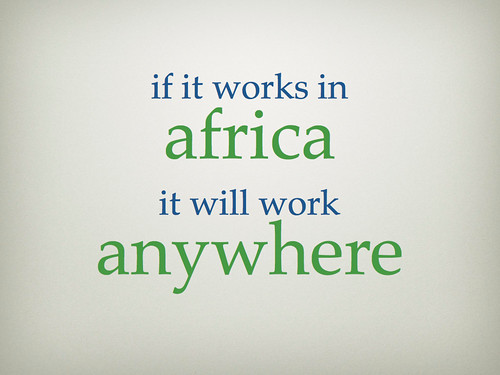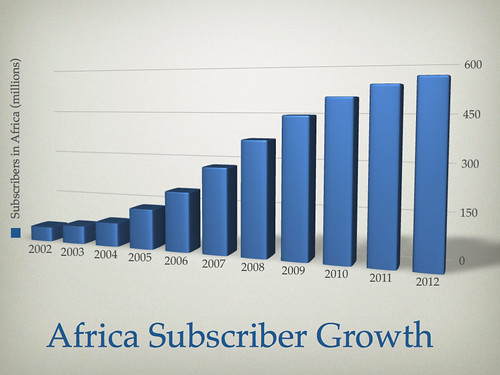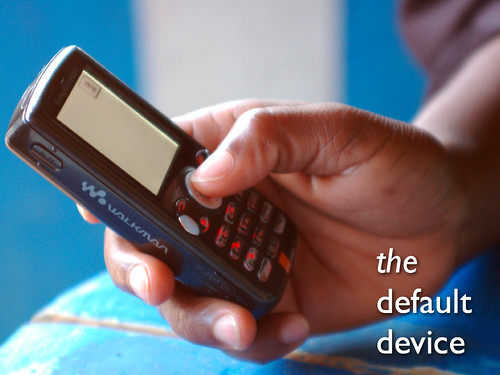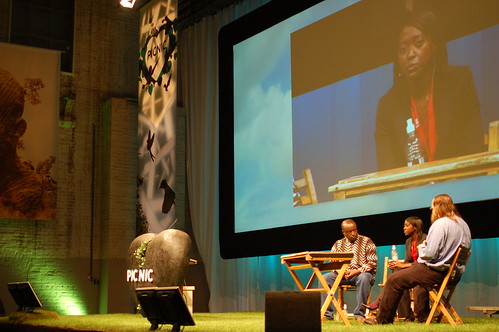WhiteAfrican
Where Africa and Technology Collide!
Page 46 of 109
(This is from my talk on mobile phones in Africa, at the Picnic conference in Amsterdam this morning.)
Africa is brimming with innovative people, projects and organizations. The fact that I’m standing here today proves this out – you see, I’ve been writing about those stories for the past 3 years.
Some of you are already familiar with Africa’s mobile stats, but not everyone is. Let’s run through some numbers, and take a minute to really appreciate the staggering growth of just one industry on our continent.
Statistics
- At the end of 2007 there were over 280 million mobile phone subscribers in Africa, representing a penetration rate of 30.4%
- Africa has become the fastest growing mobile market in the world with mobile penetration in the region ranging from 30% to 100%
- Look at the diversity in penetration rates among countries, just in Africa. It’s good to remember that when we speak about “mobile phones in Africa” that not all are created equal.
- Fastest growing markets are in Nigeria, South Africa and Egypt
- Increased competition as more operators come online in each country (11 in Nigeria, 4 in Kenya and SA, 3 in Egypt and Morocco)
- Pre-paid subscriptions account for nearly 95 percent of total mobile subscriptions in the region
How fast has it grown?
- The Democratic Republic of Congo, population 60 million, has 10,000 fixed telephones but more than a million mobile phone subscribers.
- In Chad, the fifth-least developed country, mobile phone usage jumped from 10,000 to 200,000 in three years.
What sectors does this touch? All, of course, but mobile’s have proven especially effective in:Transport, Micro-commerce, Finance, Healthcare, Governance, Education, Infotainment
Examples of innovative services
Mobile payments and mobile banking
- MPESA – This is what happens when the rest of the world ignores your need for a payment system. One of the golden children of Africa’s mobile revolution, when anyone brings up a successful mobile service in Africa. It works, and we’re all extremely happy to have the idea of mobile micro payments piloted and tested by Safaricom, but it also promotes a carrier monopoly in an industry AND continent that is crying for a real payment solution.
- Wizzit – Mobile banking in South Africa
- Celpay – Zambia – An innovative payment solution that allows consumers and businesses to complete cash transactions from their mobile phones. CelPay eliminates the problems that accompany dealing in cash visits to the bank, waiting in lines, counting and recounting money, fear of theft, and forgone interest payments. Instead, consumers with CelPay can use their mobile phone to do anything they would with cash, thanks to a payment system that works like a bank account.
Africa News Mobile Reporters
The Dutch group behind Africanews.com has put together a fleet of reporters around Africa using high end mobile phones, equipped with video and camera, to report short interviews and events from the field. Nokia/Reuter’s mobile newskit – Nokia N71
Ushahidi – Citizen reporting during a crisis (now an open source project).
mPedigree
Ashifi Gogo created a way to use SMS to authenticate drugs in Ghana, a system that simplifies and decreases the cost of doing this and that can be replicated anywhere in the world.
Winafrique’s Wind-powered cellular towers
Hybrid wind and diesel turbine systems for powering cell phone base stations.
Agricultural markets
Tradenet
A free service for farmers in West Africa to see local agricultural market prices around their region. It enables farmers and traders in agricultural commodities in Africa to conduct business through the use of SMS.
Manobi
Senegalese company Manobi, which operates online systems for businesses in the developing world, first launched the trading platform for farmers and fishermen in the west African nation, and says it has signed up 40,000 customers there. Farmers can access the information on a web-based trading platform via Internet-enabled phones, or can request prices and make trades via SMS, or text message.
How is it being used?
Projects, products and services created as secondary services by individuals and organizations all over the continent.
Restricted mobility
A cell phone operator in a remote African village where competition is tough, offers his customers some privacy, by allowing them to try out a cell phone, tethered to a long wire.
Steve Mutinda‘s 3 java applications
Shows an individual using his free time, and trying to create applications that are value added and will make him money. He epitomizes the smart, young entrepreneurs of the continent.
Morris Mbetsa – “Block & Track” auto anti-theft system
Feedelix, dealing with government censorship (Ethiopia)
The Ethiopian government instituted SMS filtering services, which caused some enterprising Ethiopians to launch Feedelix, which is an SMS-like client that supports Amharic characters. The Java application then uses the ability of many phones to transmit data via GPRS through internet protocols to mimic SMS.
Ethioblog – Literacy and/or linguistic challenges
There are challenges to in Africa too, where there are higher rates of non-literacy, or where they don’t speak the language available on their handset. Last year in Ethiopia, some guys got together and developed 200 Amharic language characters that they used to develop a phone book, message and phone settings in Amharic.
Mobile phone equipped bicycles – Bodaphone (Kiwanja), Wheelchair bikes equipped (Ruud Elmendorp)
Phone charging stations/businesses
Most of the time this takes the simple form of a car battery, but you’ll also find enterprising people using other methods (legal and illegal) to run business that only do this.
In Summary
The truth is that there are some very interesting, and surprising, developments coming out of Africa. Every culture modifies use or the device itself to meet local needs – this is no different in Africa, and we’re seeing that evolution happen right before our eyes.
The default device in Africa is the mobile phone.
Here’s one more compelling thought. The challenges brought about by bad governance, poverty, low bandwidth (all the negative things you associate with Africa) also provide an incredible opportunity. The developers who are coming up with solutions in the continent, the ones who are writing software or hacking hardware, are creating for some of the harshest environments and use-cases in the world. If it works in Africa, it will work anywhere.
(Africa News has the video up already – video’d through their mobile phone of course. )
…Then you’re not paying enough attention.” – Ethan Zuckerman at Picnic ’08
Ethan has just finished giving an excellent 20 minute talk on why people need to start paying attention to Africa. Not for Africa’s good alone, but for their own good as well.
One of the comments made was that the African reaspora will be the ones who rebuild Africa. Those are the Africans who have left and are now coming back with money, purpose and drive to see change happen. Binyavanga Wainaina and Helen Omwando represent that group, and are up on stage having a conversation with Ethan, discussing what is really going on.
“The default form of organization in Africa is a tribe.”
– Binyavanga Wainaina
“When you force people to use Western Union, you’re basically saying, ‘go rob this guy’.”
– Ethan explaining how having such a high profile, undistributed means of transferring money sets up the receiver of the funds as a target.
More tomorrow at the day-long event on Africa – I go on stage at 10:30 and will be talking about how mobiles are being used in Africa.
I’m really excited to be almost on the airplane today as I’m heading to Picnic to take part in the festival. I’ll be speaking on Friday, the day focused on “Surprising Africa” (as in, you’d be surprised at what type of innovation is coming out of Africa).
If you take a look a the lineup of speakers it’s rather impressive. In fact, it’s a little depressing realizing that I have to go on stage right after the incomparable Binyavanga Wainaina. I had the pleasure of seeing him talk at TED Global last year in Tanzania, and he was even better there than in his normal writing. Besides Binyavanga, I’m also looking forward to hearing Ethan, Gisel Hiscock from Google, and Younghee Jung of Nokia.
Afrophile Meetup
Tomorrow evening (Wed, 24th at 6pm) a couple of us involved with tech in Africa are getting together for an Ethiopian dinner at the Abyssinia restaurant. If you’re free and want to come hang out for a couple hours, we’d love to have you.
My good friend Josiah Mugambi in Nairobi was at the Kenya chapter of the Institute of Electrical and Electronic Engineers (IEEE) exhibition in Nairobi last weekend. This is where students showcase their innovation in engineering, ICT, mobile application and renewable energy. He did me a great favor by sharing some pictures and research that he did on some of the really interesting students he came across.
1. MPESA Online Shopping
By Denis Ndwiga Nyaga
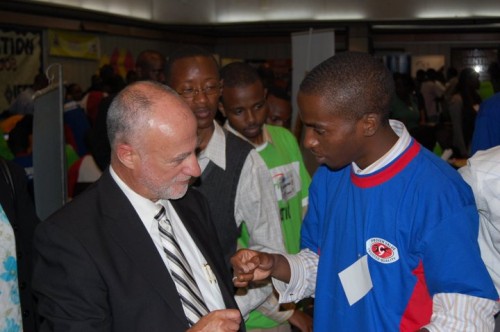
Safaricom CEO Michael Joseph was especially interested in this one for obvious reasons. Denis called it ‘nakupesi‘, Naku for Nakumatt (the local mega-store). nakupesi is an online shopping mall, with payment based on MPESA. One would need to be registered on MPESA to be able to pay for items online via MPESA. One thing that is possibly lacking is delivery to one’s residence or office after purchase. This shouldn’t be too hard to incorporate though.
2. Green Tree Markets – a Business Intelligence tool for farmers
By Andrew Owuor
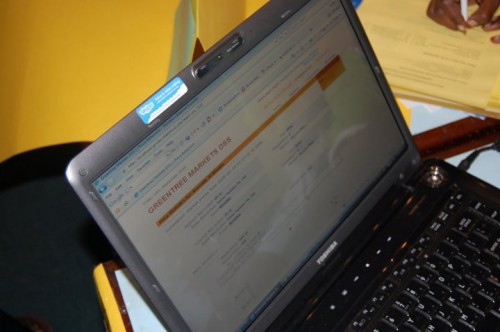
This looked quite interesting – A business intelligence tool that allows a farmer to choose where to sell his produce based on price, and location. Some of the obstacles that the developer Andrew Owuor mentioned include the need for real time market data from markets round the country, for the system to be of use. This isn’t a completely new idea, but it’ll be interesting to see what local twists are created for East Africa.
3 more…
3. Automatic headlight dimming for two approaching vehicles – By Jemimah Wachenje
Jemimah has developed a system that automatically dips two vehicles head lights when approaching each other at night. Josiah has ranted about headlights before, and I agree, it would be very useful and potential could reduce some accidents on those dark lightless roads around Kenya.
4. Energy harvesting using piezos to charge mobile phones – by Richard Assanga Otolo and Gilbert Barasa
Very interesting, yet practical.
5. Synchronous Solar Heliostat – by Samuel Njoroge
Sammy Njoroge’s demostration of a synchronous solar heliostat used to track the sun, and orient a solar panel accordingly thus improving the efficiency of solar panels. Automatic tracking of the sun to increase the efficiency of solar panels, Makes economic sense. Innovation runs in the family it seems.
I’ve finally gotten around to adding a simple calendar of African technology events that are upcoming focused around the continent and abroad. The astute amongst you would notice it in the navigation above. It is meant to be a resource for others to find (and tell others of) conferences that they are interested in.
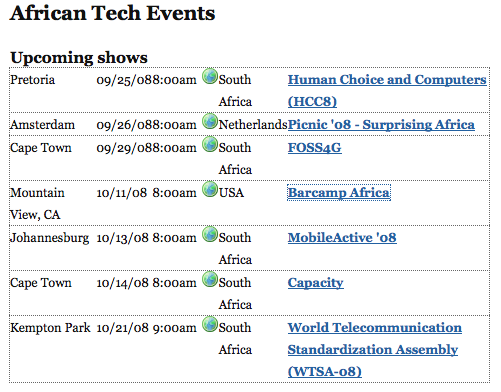
If you have an upcoming tech event, contact me and let me know the following information:
- Name
- Dates
- Venue
- City, Country
- Website
- Short summary of event
I know there are some Barcamps and local tech events upcoming around East and West Africa. Get them to me to add to the calendar. It seems like it’s all South Africa at the moment.
[sidebar: yes, I know it’s not pretty yet, I’ll get to that as I can… I’m using Dan’s Gigs Calendar WP plugin for this.]
If you follow a lot of web startups, you see that many have a hard time reaching critical mass. Even more have a hard time staying in business, so “time alive” becomes an important measuring stick. Zoopy, a web video hosting site, has gone from strength-to-strength ever since they first launched in two years ago. They have done this by working very hard, and by focusing on their niche: South Africa.
Zoopy Upgrades
A recent investment partnership by Vodacom put them in a position to announce some major new upgrades this week.
- Local South Africa hosting – This allows for much faster speeds, particularly important when dealing with video and images.
- Doubled file sizes – Users can now upload 200Mb files, as opposed to the old 100Mb limit.
- A new video player – A spiffed up and much more usable video player.
The Importance of Being Local
I’m particularly impressed with the move to local servers for their content. Besides local goodwill issues, South Africans are very patriotic and like to see stuff succeed in-country. International hosting is cheaper, but the user experience is eroded due to lag. However, as Jason mentions in a comment,
“The biggest question here for us was: how could we afford NOT to move in this direction for the South African online community at Zoopy? Our users deserve more, and we’re happy to deliver.”
Right now, Jason Elk and some of the Zoopy team are in New York at the Web 2.0 Expo, measuring their product against the competition, and learning from their peers.
I’m a big fan of Zoopy, enough so that we’ve moved to Zoopy as AfriGadget’s video hosting site as of this Summer. Congrats guys, and keep up the great work!
© 2025 WhiteAfrican
Theme by Anders Noren — Up ↑
